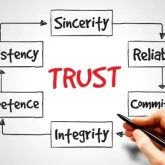How to Increase Trust with Others
How to Increase Trust with Others
 Recently, I taught three separate sessions of Building Trust to engineering managers and technical leaders. This Ken Blanchard course provides their ABCD model of the four elements of trust, specific actions for building trustworthiness, and a three-step process for rebuilding trust once it has been broken.
Recently, I taught three separate sessions of Building Trust to engineering managers and technical leaders. This Ken Blanchard course provides their ABCD model of the four elements of trust, specific actions for building trustworthiness, and a three-step process for rebuilding trust once it has been broken.
Blanchard’s ABCD Building Trust Model includes these 4 key elements:
- Able – This is demonstrating competence. Being able means having expertise, a track record of results, and effective planning, problem-solving and decision making skills.
- Believable – This is acting with integrity. Being believable means being honest, acting on personal and organizational values, and demonstrating fairness.
- Connected – This is caring about others. Being connected means demonstrating kindness, concern and compassion for others (empathy), listening and sharing information, and building rapport with others.
- Dependable – This is honoring commitments. Being dependable means keeping promises and meeting deadlines, being accountable, and being responsive to others’ needs.
All four elements must be present in order to have high trust. Think about the your most important relationships at work and at home. Are you falling short in any of these areas with any of your key relationships? If so, you may need to work at re-building trust. This can be done by using Blanchard’s 3-step process: Acknowledge, Apologize and Act.
- Acknowledge – Assess which elements of trust (ABCD) were broken, admit your mistakes, invite feedback, and listen with empathy.
- Apologize – Say you’re sorry, ask for a fresh start, and share your hopes for rebuilding the relationship.
- Act – Identify what actions you will take, agree on how you will move forward, and set a time to check-in on progress.
Trust goes both ways. Has someone eroded your trust in them? Blanchard has an 8-step process for holding this conversation as well.
- Step 1 – Share your hopes for the conversation. (“My hope is that we have an open dialogue around what breaks trust and how we can build trust going forward.”)
- Step 2 – Ask the other person to share their hopes for the conversation as well as feedback on their trust with you. (“What is your hope for this conversation? When have you experienced low trust with me? What was the impact?”)
- Step 3 – Actively listen without becoming defensive.
- Step 4 – Clarify your understanding of what they’ve shared with you. (“Let me make sure I understand…”)
- Step 5 – Share your feedback on your trust with them. (“I experience low trust when… The impact on our relationship is…”)
- Step 6 – Make requests of each other to rebuild trust. (“What can we both do going forward to rebuild trust between us?”)
- Step 7 – Confirm a plan for rebuilding trust going forward. (“Let’s recap what we’re committing to… When can we follow up?”)
- Step 8 – Revisit the hopes you both had for the conversation and determine if they were met.
It can be very difficult to repair and re-build trust once it’s been broken. However, having an open dialogue using these steps and then taking action in the appropriate trust elements are the keys to moving forward. It takes courage to hold a conversation with someone after you have eroded their trust or they have eroded yours, but it is necessary in order to rebuild trust and restore the relationship. May we all become more trustworthy by finding ways to demonstrate our ability, integrity, goodwill, and dependability every day.
“Create the kind of self you will be happy to live with all your life.” – Golda Meir
“Your actions speak so loudly, I cannot hear what you are saying.” – Ralph Waldo Emerson
“Trust is the glue of life. It’s the most essential ingredient in effective communication. It’s the foundational principle that holds all relationships.” – Dr. Stephen Covey
Coaching Readiness Assessment
Try our FREE Online Coaching Readiness Assessment to evaluate your readiness for leadership coaching.
LOCATION
Primary Location
3010 Highland Parkway, Suite 200
Downers Grove, IL 60515, US


